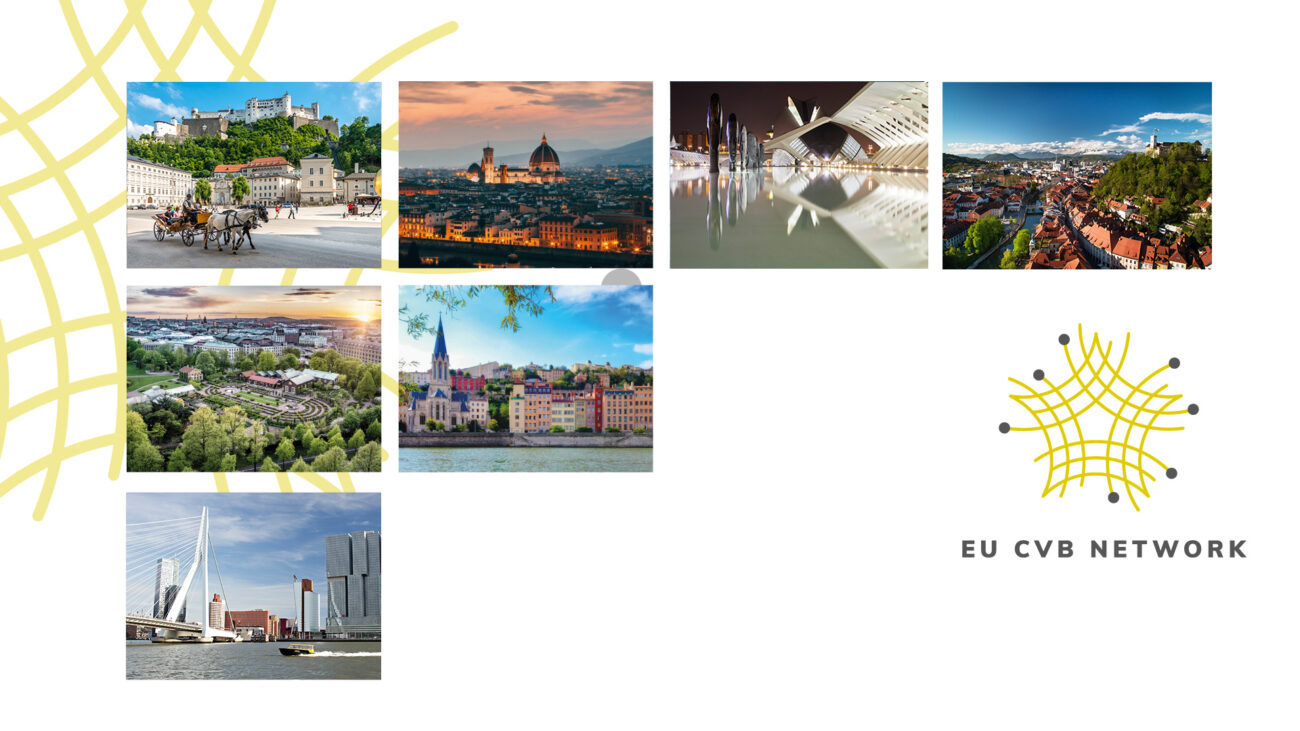With a focus on collaboration and partnership, seven convention bureaux representing the cities of Florence, Gothenburg, Ljubljana, Lyon, Rotterdam, Salzburg and València came together to create the EU CVB Network. This collaborative convention bureau network was formed with a strong belief that by working together and generously sharing knowledge, experiences and best practice, both destinations and clients would benefit.
When it comes to sustainability initiatives, the EU CVB Network has solid cards to play. In fact, all of its members share common characteristics that make them inherently sustainable: they’re all compact, easily walkable cities with strong legacy possibilities, where you can have access to knowledge and industrial clusters.
Whether sustainability is just a trend is no question anymore and associations can actually only gain working with the alliance. Most of the Network’s members rank highly in the GDS-Index, the leading sustainability benchmarking and improvement programme for destinations around the world (with Gothenburg even being #1!), and all of them have come up with interesting environment-friendly or socially responsible projects associations can easily use when organizing a conference with either of them.
7 iconic sustainability achievements of the EU CVB Network
+ In Florence, Treedom is the first platform in the world that allows you to plant a tree from a distance and follow the story of the project online.
+ Gothenburg prides itself on the early joint and bold commitment by suppliers in the destination to put sustainability on top of their agenda, leading to the #1 position in the GDS Index and the title of European Capital of Smart Tourism 2020.
+ Ljubljana was awarded the prestigious title of European Green Capital 2016 as a result of the city’s achievements regarding smart, sustainable and inclusive development.
+ Lyon was the first city in France to have its own bike sharing system (2005), a real success that inspired other French cities.
+ The Floating Farm, a self-sufficient farm on water in Rotterdam, produces fresh food in an animal-friendly and sustainable way.
+ Salzburg has the highest density of organic farms in Europe, which provide a great variety of food choices for caterings and the likes.
+ Valencia was the very first city worldwide to certify and verify the carbon footprint of its tourist activity.
“In the events industry there are high demands from event organizers and great expectations of venues and destinations,” says Manuel Ferrís of València Convention Bureau. “Sustainability is a critical factor when it comes to being a responsible business. Associations are very concerned about organizing sustainable meetings and events to show what they stand for.” A view that is shared by Ulrika Scoliège of Gothenburg Convention Bureau, and she even goes one step further saying CVBs should be proactive in their approach: “Demand is definitely increasing. As suppliers, we have a responsibility to be progressive. We challenge, inspire and influence planners to contribute to a more sustainable future, together. We want meetings and events to make a difference.”
In this regard, there is a deep-rooted need for associations to get educated on how to do business best in the future and how this requires the adoption of more progressive tools, as the inability to travel has taught us. Associations are adapting their strategies, destinations are here to help, and this is where sustainability comes in. “In Rotterdam we are working towards the goals of a balanced society, clean and reliable energy, a climate resilient Rotterdam to the next level, 21st century-ready infrastructure, and a sustainable future. These factors all come into play when choosing a conference destination nowadays,” believes Maaike Hamann of Rotterdam Partners Convention Bureau.
Echoing her comment, Tatjana Radovic of Ljubljana Convention Bureau, says: “Sustainability is becoming an increasingly important factor in the destination selection process, whilst not decisive yet. We however notice more association bid documents have included this topic among the requirements (questions on sustainability initiatives, GDS Index, etc.), which is at the core of the key strategic documents of both the City of Ljubljana and Ljubljana Tourism. This has resulted in a number of international sustainability recognitions.”

Similarly, Florence has “included a dedicated part on sustainability initiatives in [its] bid documents”, comments Ilenia Pasi of Firenze Convention Bureau, adding that “the city now bets a lot on sustainable mobility which is becoming increasingly popular these days. Moreover, Florence is now investing a great deal on a Smart City Plan in the framework of the European project “Replicate.” It is in fact one of the leading cities for this initiative (#1 in the Italian ICity Rank 2o2o). Our goal is to find the right balance among spaces, places and people!”
Of course, no sustainability initiative works in isolation. In fact, they’re most of the time part of a broader urban and tourism strategy. “Selected as European Capital of Smart Tourism in 2019 by the EU, Lyon is involved in a responsible tourism strategy,” shares Valérie Ducaud of Lyon Convention Bureau. “We promote local partners who can demonstrate an environmentally-friendly approach, share advice and tools with event organizers to increase the number of sustainable events. We are also part of the GDS Index, aiming to become certified ISO 20121, and an Innovative and Sustainable Destination IDS this year, a label that was created by France Congrès.”
In the end, all this is done to maximize the association’s success. Understand what it is they want to achieve with their conference is of paramount importance. “We proactively communicate our many sustainability offerings to our clients such as the use of public transport or venues with green certifications, and how they can be embedded in their event. It can start with small measures which not only save resources but also result in economic success,” believes Elisabeth Kassanits-Pföss of Salzburg Convention Bureau. “Luckily, it has become a self-evident factor that contributes to very positive outcomes for delegates and planners alike.”
To follow the EU CVB Network on LinkedIn, click here.
